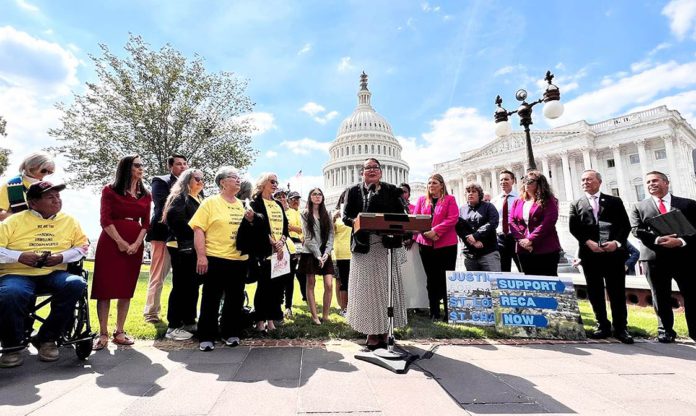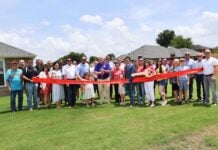
WASHINGTON, D.C. – Last week, 25th Navajo Nation Council Speaker Crystalyne Curley and Navajo Nation Washington Office Executive Director Justin Ahasteen stood on Capitol Hill in unity with members of the Navajo Uranium Radiation Victims Committee, rallying with a select group of Congressional leaders. Together, they urged for the passage of a critical extension and expansion of the Radiation Exposure Compensation Act (RECA) – legislation that is set to expire in July 2024.
The RECA, initially enacted in 1990 and subsequently amended in 2000, was established as a means to offer one-time compensation to the veterans of, and communities impacted by, the fallout of America’s uranium industry and its nuclear development program. This was particularly significant for the Navajo Nation, where uranium mining had left an enduring health and environmental legacy.
In July, the U.S. Senate approved an amendment incorporating S. 1751, a bill sponsored by U.S. Sen. Ben Ray Lujan (D-NM) for the expansion and extension of RECA, into the National Defense Authorization Act (NDAA). Its counterpart in the House, H.R. 4426 – sponsored by Congresswoman Teresa Leger Fernández (D-NM) – is currently awaiting consideration.
These bills are comprehensive in their scope. They propose the inclusion of post-1971 uranium workers and core drillers, an extension of RECA until 2040, the recognition of renal cancer as a compensable illness, the allowance of combined work histories, and the expansion of eligibility areas for downwind exposure. They also aim to increase compensation for atmospheric testing claimants, including downwinders, and accept affidavits for work history, physical presence, and on-site participation. Furthermore, they call for an Epidemiological Impact Study to examine the effects on uranium miners, their families, and others exposed outside of work settings.
“The amendments to expand and extend the Radiation Exposure Compensation Act are a much-needed stride towards justice that our Navajo people have been patiently awaiting,” said Speaker Curley. “Right now, Congress has the opportunity to alter its course by fully passing the 2023 Radiation Exposure Compensation Act amendments included in the National Defense Authorization Act. To support the amendments introduced by Senators Josh Hawley, Mike Crapo, and Ben Ray Lujan is to offer hope to the Navajo people, a people who have shown unwavering commitment and loyalty to the United States of America. I call upon Congress to acknowledge the patriotism of the Navajo people, their service, and their sacrifice. It’s time to do what is just, what is right, and what is long overdue.”
The gathering also saw members of the Navajo Uranium Radiation Victims Committee, a grassroots organization led by Phil Harrison, share their deeply personal narratives of pain and ongoing health struggles. These stories serve as testimonials to the adversities faced by many former Navajo mine workers and their families, even today.
This cause was bolstered by the support of U.S. Sen. Josh Hawley (R-MO), U.S. Eric Schmitt (R-MO), and Delegate to the House of Representatives for Guam, James Moylan, who joined Sen. Lujan and Congresswoman Leger Fernández in advocating for the RECA bills, standing in solidarity with advocates from across the nation.















































